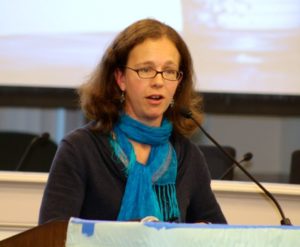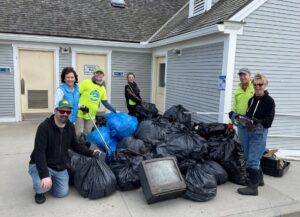
BARNSTABLE – Silent Spring Institute has partnered with the University of Rhode Island and Harvard to establish a new research center focused on chemical contaminants in drinking water and their effects on health – and Cape Cod will have a crucial role.
Along with generating new knowledge about PFAS contaminants, or pre- and polyfluorinated chemicals, researchers have partnered with Cape towns for community engagement activities, identifying new sources and reducing exposures.
“Cape Cod is vulnerable because everyone relies on shallow drinking water wells, either public or private wells,” said Laurel Schaider, a research scientist with Silent Spring Institute. “And the geology allows for the movement of contaminants from the surface at the ground down into where drinking water is pulled from.”
The chemicals are of great concern on Cape Cod and have recently been tested above EPA guidelines in public drinking wells in Hyannis and Mashpee, and in private drinking wells near Joint Base Cape Cod.
The contaminants have been traced back to the use of firefighting foams at the Barnstable County Fire/Rescue Training Academy, Barnstable Municipal Airport and Joint Base Cape Cod.
“Last year the Hyannis water system actually issued a do not drink advisory for infants, pregnant women, and breastfeeding mothers while they put in new treatments to address these highly fluorinated chemicals,” Schaider said.
The five-year project, led by URI, is being funded through an $8 million grant from the National Institute of Environmental Health Sciences Superfund Research Program and is bringing together researchers and communication experts to tackle the questions of highly fluorinated chemicals on the local and national level.
Silent Spring Institute, which is dedicated to science that serves the public interest, will be taking part in some of the research through the center.
“One of the goals for the new research center is to develop new ways to detect these chemicals in water so we’ll be working with researchers from URI and Harvard to try out these new methods in surface waters across Cape Cod,” Schaider said.
The organization will also be partnering with the Massachusetts Breast Cancer Coalition, GreenCAPE and the Sierra Club to work with communities across the Cape.
“We’ll be developing a private well testing program so that people who have private wells can have their water tested for these chemicals,” Schaider said.
Silent Spring will also be a resource for the community by sharing their findings, educating citizens about contaminant issues and helping to spread information on public health and environmental policies.
“We’ll be organizing an annual science day and finding other ways, such as Silent Spring’s annual research updates, to let people on the Cape know about our new research findings,” she said. “And also to hear the questions and concerns from the community members and hopefully find ways to address those questions.”
By BRIAN MERCHANT, CapeCod.com NewsCenter























